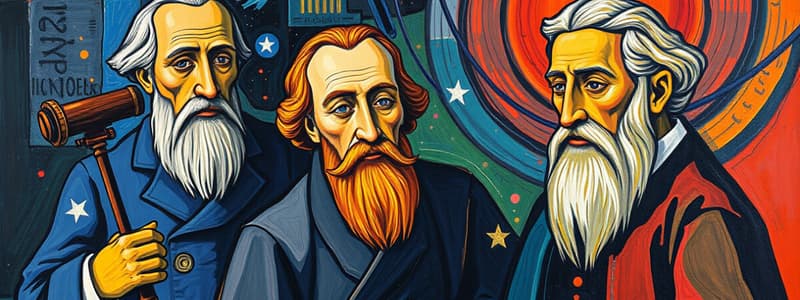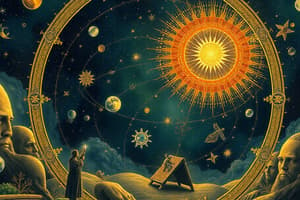Podcast
Questions and Answers
Who cataloged 850 stars and founded trigonometry?
Who cataloged 850 stars and founded trigonometry?
- Galileo
- Ptolemy
- Hipparchus (correct)
- Copernicus
What is the Ptolemaic system related to?
What is the Ptolemaic system related to?
Geometric Theory
What theory did Copernicus propose?
What theory did Copernicus propose?
Heliocentric Theory
What significant astronomical tool did Galileo improve upon?
What significant astronomical tool did Galileo improve upon?
What was Kepler known for?
What was Kepler known for?
What major discovery did Cassini contribute to?
What major discovery did Cassini contribute to?
What did Newton found?
What did Newton found?
What did Banneker predict?
What did Banneker predict?
What did William Herschel create?
What did William Herschel create?
Who was the first female American astronomer?
Who was the first female American astronomer?
What did Leavitt study in relation to astronomy?
What did Leavitt study in relation to astronomy?
What is Hubble known for?
What is Hubble known for?
What discovery is Stephen Hawking famous for?
What discovery is Stephen Hawking famous for?
Study Notes
Hipparchus
- Active from 190-120 B.C., pivotal in astronomical history.
- Known for cataloging 850 stars and founding trigonometry, significantly advancing celestial navigation.
- Researched the precession of the equinoxes, influencing future astronomers.
Ptolemy
- Lived from 100-170 A.D., a key figure in ancient astronomy.
- Developed the Ptolemaic system, a geocentric model of the universe, which dominated for centuries.
- Authored the "Almagest," a comprehensive astronomical treatise.
Copernicus
- Flourished between 1473-1543 A.D., known for proposing the heliocentric theory, positioning the sun at the center of the universe.
- Experienced personal loss as he was orphaned at the age of ten.
- His work paved the way for subsequent astronomical discoveries, coinciding with the era of Christopher Columbus.
Galileo
- Lived from 1564-1642 A.D., innovated the use of the telescope in astronomy.
- Discovered four significant moons of Jupiter, expanding knowledge of celestial bodies.
- Home-schooled until age 11, demonstrating early aptitude in science.
Kepler
- Active from 1571-1630 A.D., known for formulating laws of planetary motion.
- Practiced Christianity, influencing his scientific perspective.
- Witnessed the Great Comet of 1577, which fueled his interest in astronomy.
Cassini
- Lived from 1625-1712, known for his work on Saturn's moons.
- A space probe is named after him, acknowledging his contributions to space exploration.
- Made significant observations about the distance of Mars, enhancing knowledge of our solar system.
Newton
- Born in 1643 and passed away in 1727, regarded as the father of modern physics.
- Formulated the Three Laws of Motion, laying the groundwork for classical mechanics.
- Made notable contributions to calculus, and famously (though apocryphally) stuck a needle in his eye during an experiment.
Banneker
- Lived from 1731-1806, renowned for predicting solar eclipses and creating almanacs.
- Notably born free in an era of slavery, contributing to his prominence in science.
- His work symbolizes the intersection of civil rights and scientific achievement.
William & Caroline Herschel
- William (1738-1822) and Caroline Herschel (1750-1848) made significant astronomical discoveries.
- William discovered Uranus and built the largest telescope of his time.
- Caroline was recognized for discovering a comet, contributing to the field as the first female astronomer.
Maria Mitchell
- Lived from 1818-1889, first female American astronomer and pioneer for women in science.
- Detected the orbit of a new comet, which was later named in her honor.
- Championed women's roles in astronomy and the sciences.
Leavitt
- Flourished from 1868-1921, made critical advancements in stellar luminosity.
- Measured star brightness, increasing understanding of the scale of the universe.
- Had a strong interest in music, highlighting the interdisciplinary nature of her work.
Hubble
- Active from 1889-1953, a foundational figure in extra-galactic astronomy.
- Developed the Hubble Sequence classification of galaxies, revolutionizing the study of the cosmos.
- Served in the military, showcasing a diverse background beyond astronomy.
Hawking
- Lived from 1942-2018, made groundbreaking contributions to black hole physics and cosmology.
- Formulated the concept of Hawking radiation, challenging existing theories of black holes.
- Diagnosed with ALS, he became a symbol of perseverance in the scientific community.
Studying That Suits You
Use AI to generate personalized quizzes and flashcards to suit your learning preferences.
Description
Test your knowledge of key astronomers with the Classical Conversations Flashcards. This quiz covers significant figures such as Hipparchus, Ptolemy, Copernicus, and Galileo, focusing on their contributions to astronomy. Perfect for students looking to enhance their understanding of historical developments in the field.




